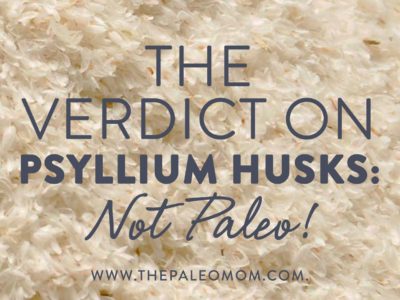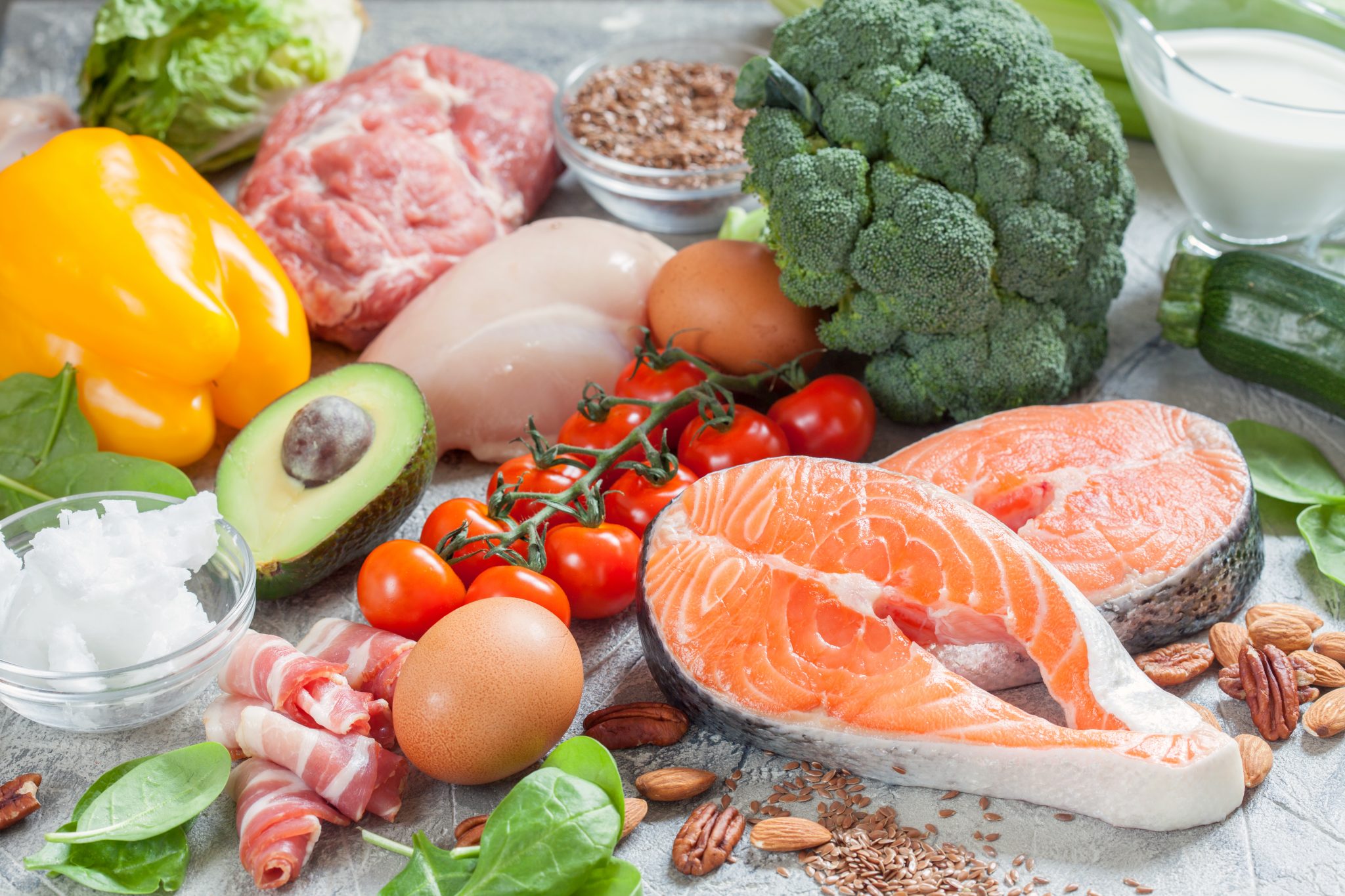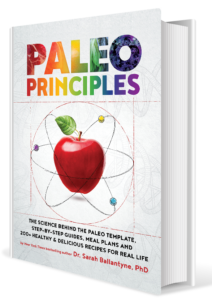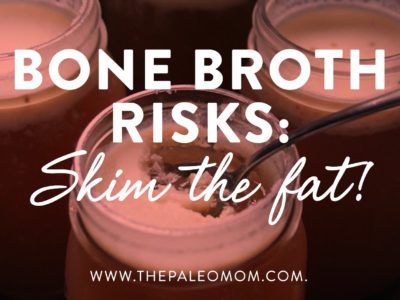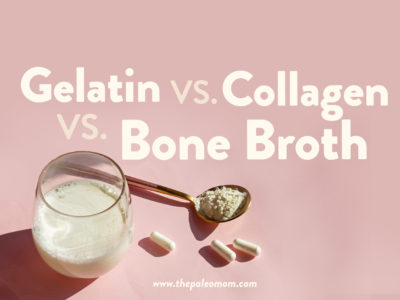With increasing frequency, unhealthful ingredients are creeping into recipes labeled as Paleo or food products catering to the Paleo community. Part of the problem, is that when we define the Paleo diet over-simplistically (as avoidance of grains, legumes, dairy, refined oils, refined sugars, and processed food chemicals), we lose the critical thinking part of defining an optimal human diet. Plenty of ingredients could be classified as Paleo based on not falling into any of the off-limits categories, but that doesn’t make them a good or nutritious food. It doesn’t even imply that it’s harmless. Instead, when it comes to determining whether a food should have a place in our diets, I prefer to look at what the science says.
Table of Contents[Hide][Show]
I think it’s important to consider the nutrients that a food contains versus the potential for a negative health impact. Sometimes this approach yields results that are contrary to Paleo principles. For example, I recently supported blackstrap molasses as a nutrient dense food (see here). But, I recently criticized the use of guar gum and xanthan gum, which are sneaking their way into Paleo-labelled recipes and foods (see here). And it’s time to tackle another ingredient being used when it shouldn’t be: psyllium husk.
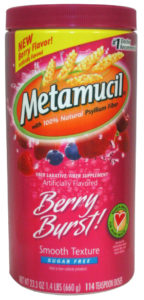 Psyllium husk has long been used to treat constipation and promote regularity (psyllium is the “magic” ingredient in Metamucil!) due to its ability to increase stool bulk. It’s also a common component of colon-cleanse programs promoted in some alternative health circles (which, like coffee enemas, I recommend steering clear of!). And, thanks to its texture and culinary chemistry properties, it’s becoming a common ingredient in Paleo recipes that call for gluten-free (or low-carb) flour substitutes.
Psyllium husk has long been used to treat constipation and promote regularity (psyllium is the “magic” ingredient in Metamucil!) due to its ability to increase stool bulk. It’s also a common component of colon-cleanse programs promoted in some alternative health circles (which, like coffee enemas, I recommend steering clear of!). And, thanks to its texture and culinary chemistry properties, it’s becoming a common ingredient in Paleo recipes that call for gluten-free (or low-carb) flour substitutes.
But, are psyllium husks really beneficial for our health? The answer isn’t so rosy! There are actually some major downsides to psyllium that should make us think twice before adding it to our diets.
What Are Psyllium Husks?
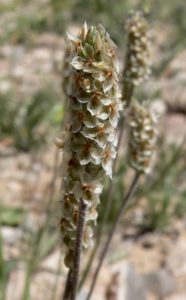 Psyllium husks (also called ispaghula, isabgol, or just psyllium) are the protective sheath around the seed of the Plantago ovata plant, which grows naturally across certain parts of Asia and Africa. Due to their high content of mucilage, psyllium husks are hygroscopic, which means they expand by attracting water and forming a slippery gel (which is part of what makes them a useful ingredient-binder in recipes!). They’re also about 70% soluble fiber and 30% insoluble fiber, the majority of which isn’t fermentable by our guts.
Psyllium husks (also called ispaghula, isabgol, or just psyllium) are the protective sheath around the seed of the Plantago ovata plant, which grows naturally across certain parts of Asia and Africa. Due to their high content of mucilage, psyllium husks are hygroscopic, which means they expand by attracting water and forming a slippery gel (which is part of what makes them a useful ingredient-binder in recipes!). They’re also about 70% soluble fiber and 30% insoluble fiber, the majority of which isn’t fermentable by our guts.
What Are the Benefits?
Most of what we hear about psyllium are its benefits. Not only does psyllium husk effectively soften stools (which makes it beneficial for people with constipation, hemmorhoids, anal fissures, and related conditions), it’s also been shown in clinical trials to improve IBS symptoms, reduce cholesterol levels, reduce blood sugar levels in diabetics (both adults and children), and potentially assist with weight loss. In people with diarrhea, psyllium is sometimes prescribed to help soak up the excess fluid and improve bowel function. So, thanks to all those potential perks, psyllium husks are usually touted as being beneficial.
But, we should keep in mind that none of these effects are unique to psyllium husks! Whole-food sources of soluble and insoluble fiber can exhibit these same health-promoting properties, while also delivering fatty acids, amino acids, and micronutrients (all of which psyllium husks are practically devoid of, since they’re merely the thin fiber layer around the more-nutritious seed). And, whole foods contain a mixture of fibers that feed beneficial gut flora, in contrast to the limited fiber composition of psyllium husks.
The Dark Side of Psyllium
Despite some proven, albeit not unique, benefits, psyllium husks do pose risks as well!
In an earlier post, I discussed how the mucilagous fiber in psyllium (and in other foods like flaxseed and chia seeds) can potentially aggravate autoimmune conditions, feed overgrowths of pathogenic bacteria, and worsen gastrointestinal symptoms. For psyllium husk in particular, studies show it also fails to improve levels of beneficial bifidobacteria in the gut, except in people who have extremely low counts to begin with (unlike resistant starch, which is easily gobbled up and fermented by bifido species!).
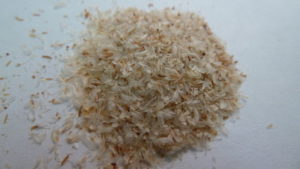 But, it doesn’t end there! Due to psyllium’s ability to bind with water, mix with other substances, and dramatically expand in size, it can form what’s called bezoars—not the magical poison antidote in the Harry Potter universe, bezoars are masses of material that obstruct the gastrointestinal tract and can cause serious damage. As early as 1938, reports were being published about psyllium causing intestinal obstruction and perforation, in some cases requiring surgery. Small bowel obstructions continue to occur even today in susceptible individuals taking this fiber. And, psyllium husks (and psyllium-based products like the laxative Perdiem) have been shown to cause esophageal impactions as well, especially when consumed with insufficient amounts of water. Umm, how’s that for scary?
But, it doesn’t end there! Due to psyllium’s ability to bind with water, mix with other substances, and dramatically expand in size, it can form what’s called bezoars—not the magical poison antidote in the Harry Potter universe, bezoars are masses of material that obstruct the gastrointestinal tract and can cause serious damage. As early as 1938, reports were being published about psyllium causing intestinal obstruction and perforation, in some cases requiring surgery. Small bowel obstructions continue to occur even today in susceptible individuals taking this fiber. And, psyllium husks (and psyllium-based products like the laxative Perdiem) have been shown to cause esophageal impactions as well, especially when consumed with insufficient amounts of water. Umm, how’s that for scary?
(Aside: I have personal experience with severe constipation and bowel impaction arising from taking Perdiem. In my mid-20s, I tried first Metamucil and then switched to Perdiem for mild constipation on the advice of my roommate, who happened to be an RN. Instead of helping, it made the situation far, far worse and I ended up not being able to have a bowel movement for 2 weeks! Severe abdominal pain finally brought me to the ER where I was helpfully diagnosed as “full of sh*t” and given a fleet enema which not only rectified the situation but demonstrated just how dire it was when I lost 8 pounds overnight. My doctor then told me that this was a known possibility with this class of stool softeners and I was instructed never to take them again.)
Even more concerning is the possibility that psyllium husks can spur colon cancer progression in people already at risk. One trial gave a group of 665 patients with a history of colorectal adenomas (precursors to cancerous colon tumors) a daily calcium supplement, a daily psyllium husk supplement, or a placebo, all for three years straight. By the end of the study, it turned out that the people taking psyllium husk had a significantly higher rate of adenomas than everyone else! As revealed by colonoscopies, 29.3% of the psyllium group developed adenomas by the three-year mark, compared to only 15.9% for the calcium group and 20.2% in the placebo group. That translates to an odds ratio of 1.67 for the study participants who took psyllium (or a 67% higher risk!). Although other studies have produced contradicting results (some rodent studies show that psyllium should benefit intestinal cells), this news is concerning for anyone who has a history of colorectal adenomas, or who has colon cancer running in their family.
Nutrivore Weekly Serving Matrix
An easy-to-use and flexible weekly checklist
to help you maximize nutrient-density.
The Weekly Serving Matrix is very helpful! I’ve been eating along these lines but this really helps me know where to focus vs. which foods serve a more secondary role. It’s super helpful and has taken a lot of worry out of my meal planning. Thanks!
Jan
And, psyllium can interact with a number of medications, including antidepressants/tricyclics (psyllium can interfere with their effectiveness), the antiseizure medication carbamazepine (psyllium reduces its absorption), the heart medication digoxin (psyllium reduces its absorption, too!). On top of that, allergic reactions have sometimes been reported for psyllium husks, both from occupational exposure and from ingestion.
Is it Worth The Risk?
So, is it worth using psyllium husks for the potential benefits (regularity, lower blood sugar, lower cholesterol, and maybe appetite suppression and weight loss)?
The answer is probably no. While occasionally eating psyllium husks (perhaps as an ingredient in a gluten-free baked good) probably won’t cause harm except in certain people with autoimmune conditions or severe digestive sensitivity, the “cons” outweigh the “pros” in this case! Psyllium husks don’t have any special properties that make them better than other fiber sources, but they do carry some legitimate dangers, and can displace far more nutritious items (like whole-food sources of fiber) from our diets. If treating constipation is a concern, it’s a better idea to address any underlying gut dysbiosis issues, get evaluated thyroid function, consume plenty of electrolytes (especially magnesium) to promote intestinal motility, eat a diverse array of plant foods, and invest in a squatty potty or step-and-go rather than to supplement with psyllium to put a bandaid on the problem. And as far as Paleo cooking goes, there are other flour substitutes we can use in recipes to support our health!
Citations:
Agha FP, et al. “Giant colonic bezoar:” a medication bezoar due to psyllium seed husks.” Am J Gastroenterol. 1984 Apr;79(4):319-21.
Bonithon-Kopp C. “Calcium and fibre supplementation in prevention of colorectal adenoma recurrence: a randomised intervention trial. European Cancer Prevention Organisation Study Group.” Lancet. 2000 Oct 14;356(9238):1300-6.
Edwards SE, et al. “Ispaghula Husk, Psyllium Husk.” Phytopharmacy: An Evidence-Based Guide to Herbal Medical Products. 20 Feb 2015.
Elli M, et al. “Evaluation of prebiotic potential of refined psyllium (Plantago ovata) fiber in healthy women.” J Clin Gastroenterol. 2008 Sep;42 Suppl 3 Pt 2:S174-6.
Fisher RE. “Psyllium Seeds: Intestinal Obstruction.” Cal West Med. 1938 Mar; 48(3):190.
Frohna, William J. “Metamucil bezoar: An unusual cause of small bowel obstruction.” The American journal of emergency medicine. 1992;10(4): 393-395.
Fujimori S, et al. “High dose probiotic and prebiotic cotherapy for remission induction of active Crohn’s disease.” J Gastroenterol Hepatol. 2007 Aug;22(8):1199-204.
Marlett JA & Fischer MH. “The active fraction of psyllium seed husk.” Proc Nutr Soc. 2003 Feb;62(1):207-9.
Moreno LA, et al. “Psyllium fibre and the metabolic control of obese children and adolescents.” J Physiol Biochem. 2003 Sep;59(3):235-42.
“Possible Interactions with: Psyllium.” University of Maryland Medical Center. September 24, 2007.
Salguero Molpeceres O. “[Esophageal obstruction caused by dietary fiber from Plantago ovata, a complication preventable by adequate information].” Gastroenterol Hepatol. 2003 Apr;26(4):248-50.
Schneider RP. “Perdiem causes esophageal impaction and bezoars.” South Med J. 1989 Nov;82(11):1449-50.
Schwartz HJ, et al. “Occupational allergic rhinitis reaction to psyllium.” J Occup Med. 1989 Jul;31(7):624-6.
Sierra M, et al. “Therapeutic effects of psyllium in type 2 diabetic patients.” Eur J Clin Nutr. 2002 Sep;56(9):830-42.
Ziai SA, et al. “Psyllium decreased serum glucose and glycosylated hemoglobin significantly in diabetic outpatients.” J Ethnopharmacol. 2005 Nov 14;102(2):202-7.

